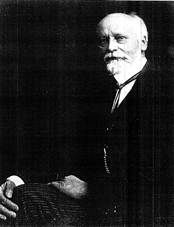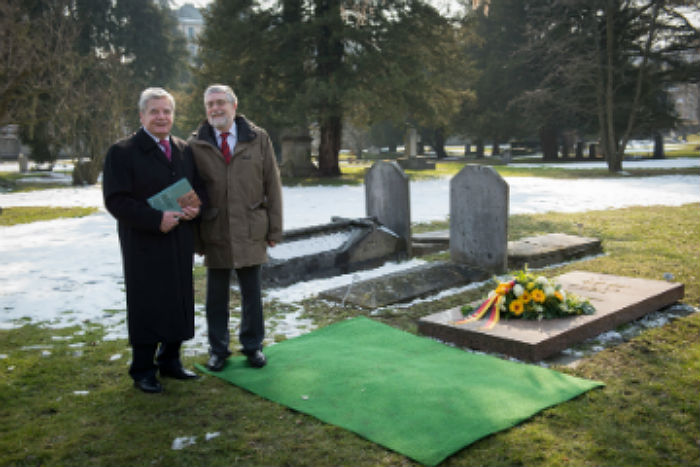 Short Biography
Short Biography
 Ludwig Quidde, born on March 23, 1858 in the city of Bremen, was a German historian, pacifist and politician who throughout his life advocated democracy, peace and international understanding.
Ludwig Quidde, born on March 23, 1858 in the city of Bremen, was a German historian, pacifist and politician who throughout his life advocated democracy, peace and international understanding.
After finishing his studies of history, philosophy and economics in Straßburg and Göttingen, Quidde worked as a historian until 1884. With the publication of the pamphlet “Caligula” Quidde’s scientific career came to a bitter end as it was considered to be a satire on Emperor Wilhelm II.
Hereafter, Quidde focused on his political activities. Amongst others, he served as a representative of the “Deutsche Volkspartei” (DtVP) in the Bavarian Assembly from 1907 until 1918. After World War I, Quidde was elected to the Weimar National Assembly. More important than his political involvement, however, was his work in pacifistic organizations; besides the moral condemnation of war, peacekeeping via international cooperation mattered to him. He tried to realize this aim amongst others by his membership in the German Peace Society (DFG) whose chairperson he became in 1914 and by organizing the World Peace Congress in Munich in 1907. In 1927, Quidde was awarded the Nobel Peace Prize together with the French pacifist Ferdinand Buisson.
When Hitler came to power, Quidde emigrated to Geneva where he lived under poor conditions, but still tried to support German pacifists in exile for example by founding the “Committee for the Support of Exiled Pacifists”.
Quidde died in exile in Geneva on March 5, 1941.
 Vita
Vita
1858-1881 Childhood and Studies
1858
March 23: Ludwig Quidde is born in the Hanseatic city of Bremen, the child of Anna Adelheid (née Cassebohm) and the merchant Ludwig August Quidde.
1877-1881
Quidde begins his study of history, philosophy and economics first at the University of Strasbourg, later at the University of Göttingen.
1881
Quidde receives his PhD at the University of Göttingen with a dissertation about the election of Sigismund of Luxemburg in 1410.
Quidde publishes a polemic pamphlet criticizing the growing anti-Semitic convictions of German students.
1881-1894 A young Historian
1881
Quidde starts to work at the „Reichstagsakten“.
1882
Marriage with the musician and author Margarethe Jacobson from Königsberg and relocation to Frankfurt am Main.
1886
Relocation to Königsberg at Margarethe’s and her family’s desire.
Quidde has to spend a lot of time apart from his home visiting archives and libraries in Germany and Italy.
1887
Quidde is appointed extraordinary member of the Historical Commission of the Bavarian Academy of Sciences and Humanities
1888
Quidde establishes the „Deutsche Zeitschrift für Geschichtswissenschaft“ (German Journal of History) which is published between 1889 and 1895 (12 issues).
1889
Quidde becomes managing editor at the „Reichstagsakten“.
1890
His increased workload due to his responsibilities as an editor and a publisher requires the relocation to Munich.
Quidde becomes director of the “Prussian Historical Station” in Rome and is appointed professor of history.
1892
Induced by a severe marital crisis Quidde resigns his position in Rome and returns to Munich to the edition of the „Reichtagsakten”.
1893
Quidde anonymously publishes "Militarismus im heutigen Deutschen Reich. Eine Anklageschrift. Von einem deutschen Historiker" (Militarism in the contemporary German Reich. An indictment. By a German historian). He states his democratic and pacifist beliefs while criticizing the expanding German militarism.
First involvement in political activities as a member of the social liberal “German People's Party”.
Quidde hosts the first „Deutscher Historikertag” (German historical convention) in Munich which he expects to contribute to the boundary adjustment of history as an academic discipline and the political sphere.
1894
After being accused of lèse-majesté for publishing his satire “Caligula. Eine Studie über römischen Caesarenwahnsinn” (Caligula: A Study in Roman Imperial Insanity) Quidde is socially isolated and has to end his career as a historian. Due to the refusal of former colleagues to continue their collaboration with him, he has to cease the publication of the „Deutsche Zeitschrift für Geschichtswissenschaft“ (German Journal of History).
1894-1914 Quidde - a Pacifist and Politician
1894
He is founder of the „Münchner Friedensvereinigung“ (Munich peace association), which acts as the sub-section of the German Peace Society.
1895
Quidde establishes the „Münchener Freie Presse“ (Munich Free Press), which is closely linked to the German People's Party (German: Deutsche Volkspartei, DtVP).
Quidde participates in creating the DtVP’s manifesto. The party commits to pacifist and democratic principles and social and economic reforms.
Quidde is involved in the foundation of the „Verband Deutscher Historiker“ (German Historians' Association).
1896
Quidde becomes director of the German People's Party's regional association in Bavaria.
He is sentenced three months in prison for committing lèse-majesté.
1901/1902
Quidde becomes vice chairman of the German Peace Society and takes on the representation at a transnational level. He participates in the conferences of the International Peace Bureau and the Universal Peace Congress.
1902
First parliamentary activities at the local level: Quidde is elected into the second chamber in Munich.
1905/1913
Commitment to improve the Franco-German relationship at the Universal Peace Congress.
1907
Quidde is elected member of the Bavarian state parliament as delegate for the German People's Party. He remains in this position until 1918 and attracts attention with his critical contributions to the military and armament.
Quidde joins the Inter-Parliamentary Union, which plays an important role for the international peace work.
In September Quidde hosts the Universal Peace Congress in Munich.
1913
At the 20th Universal Peace Congress in The Hague Quidde presents a draft for an international disarmament treaty, which is highly valued by experts.
1914
From 1914 to 1929, Quidde serves as chairman of the German Peace Society.
1914-1918 Pazifismus in Kriegszeiten
1914
Maintaining his pacifist convictions after the start of World War I, Quidde is isolated within his party and even asked to resign his seat. At the same time, English, French and Italian pacifists are disappointed since Quidde does not explicitly condemn the German invasion of neutral Belgium and Luxembourg.
Membership in the pacifist association „Bund Neues Vaterland“ which has the aim to influence the Federal Foreign Office and the government to induce a fast ending of the war.
1915
Quidde decisively opposes annexationist demands in the German discourse and publishes the position papers „Sollen wir annektieren?“ (Should we annex?) and „Reale Garantien für einen dauernden Frieden“ (Guarantees for permanent peace).
1916
Due to increased repressive measures the German peace movement is forced to reduce its activities.
Quidde is co-founder of the „Zentralstelle Völkerrecht“ (Centre for International Law), which takes over the tasks of the German Peace Society and works without fixed organizational structures to avoid military repression.
1918-1933 Weimar Republic
1918
Quidde is elected Vice-president of the „Provisorischer Bayerischer Nationalrat” (Provisional Bavarian National Council). The government of the socialist Minister-President, Kurt Eisner, however does not concede much political influence to the council.
1919
Quidde is elected member of the Weimar National Assembly for the „Deutsche Demokratische Partei” (German Democratic Party).
May 12: Within the Weimar National Assembly Quidde claims that the Treaty of Versailles is incompatible with the basic principles of pacifism. This position is broadly shared in the National Assembly but decisively rejected by the radicalizing German peace movement.
1920
Following the German federal elections the German Democratic Party suffers a loss of nearly half their seats. Quidde has to leave the Assembly.
1922
Quidde becomes president of the newly founded „Deutsches Friedenskartell“ (German Peace Cartel) which coordinates the work of the different German peace organisations.
1923
Quidde and other pacifists are persistently threatened and insulted by National Socialists, which impedes their work.
Quidde loses the better part of his capital during the period of hyperinflation.
1924
Quidde’s article „Die Gefahr der Stunde“ (Danger of the moment) demands the liquidation of the “Black Reichswehr” (illegal paramilitary formations promoted by the German Reichswehr army) from the German government. Being accused of treason he is arrested for a short time.
1927
Together with the French human rights campaigner Ferdinand Buisson, Quidde receives the Nobel Peace Prize. He gives a Nobel Lecture entitled “Security and Disarmament”. Despite receiving the prize money, Quidde’s economic situation remains uncertain.
1929
Quidde resigns from his position at the German Peace Society as it is dominated by radical, younger pacifist since the late 1920s. The conflict within the German peace movement leads to the termination of the German Peace Cartel’s activities.
1930
Merger of the „Deutsche Demokratische Partei” (German Democratic Party) with the „Volksnationalen Reichsvereinigung“ (People's National Reich Association), which belongs to the nationalist and anti-Semitic „Jungdeutscher Orden“ (Young German Order). Quidde leaves the German Democratic Party and becomes co-founder of the left-liberal and pacifist „Radikaldemokratische Partei“ (Radical Democratic Party).
1932
Foundation of the „Allgemeiner Deutscher Friedensbund“ (General German Peace Association), a superordinate peace organisation to coordinate the work of the local committees that left the German Peace Society. Quidde becomes a member of the advisory council.
1933-1941 Exile
1933
After the Nazi seizure of power Quidde escapes to Geneva where he lives in exile until his death.
He is deposed from his position as managing editor at the „Reichstagsakten“ in October.
Quidde has to reduce his pacifist work due to a legal prohibition of political activities for foreigners in Switzerland and to avoid exacerbating the situation of his wife who remains in Germany. His refusal to openly oppose the Nazi Regime is criticised by other pacifists.
1934
Resumption of his activities for the International Peace Bureau.
1935
Quidde establishes the "Comité de secours aux pacifistes exilés" which has the aim to offer financial support to exiled pacifists in need.
1940
After discovering a private letter in which Quidde labels the Nazi regime “a bunch of criminals, murderers, robbers, arsonists and […] atrocious torturers and liars and hypocrites” Quidde’s German nationality is revoked and he becomes stateless.
Contrary to many other pacifists, Quidde endorses the war against Germany since in his opinion Hitler cannot be defeated otherwise. He also advocates the American entry into the war.
1941
March 5, Quidde dies in Geneva.
(Based on Holl, Karl: Ludwig Quidde 1858-1941. Eine Biografie. Droste Verlag Düsseldorf, 2007.)

